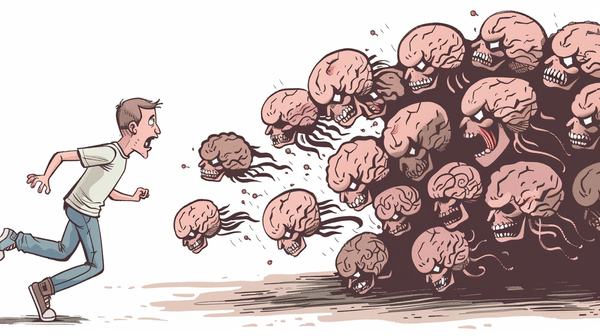Engaged Reading Time - Issue #46
And… we're back.
Sorry for the extended break. I'll talk more about it later in the week, but you'll get some clue what was happening from this post.
More to come on that front, specifically for subscribers here.
In the meantime, let's start catching up on some of the significant stories from the last few weeks.
(And hope you're enjoying the Bank Holiday, for those in the UK).

A majority of all browser-based Google searches last month resulted in zero clicks
Big news on the SEO front. Over 50% of browser searches on Google led to no clicks. This is a very typical response. And I think it missed the point.
First of all: don't panic. This isn't bad news — or, at least, as bad as it looks on the surface.
Google has been steadily building up ways of directly answering simple queries. If you're after a fact, or a date, or something like that, you need never leave Google. Google just answers that right on the page. If you've been building an SEO strategy based on that — well, more fool you. The writing was on the wall.
Any sensible strategy will incorporate content that answers more complex questions - that seeks for meaning, depth and analysis. Yes, click-driven short term strategies will evaporate. That’s always been the case. Optimising *any* publishing strategy for simple, easily-replicated information in the digital age has always been a doomed strategy. Don’t optimise fo the result - optimise for the match analysis. Don’t optimise for the broadcast time of the show, optimise for the people, the characters or the themes.
And, of course, think about how to convert those one-off visitors into loyal ones.
The machine always wins: what drives our addiction to social media
I've seen lots of positive praise for this around - but, honestly, I can't quite see why. There's very little that's new, but it is a good primer on the underlying mechanics of the social platforms. If you're not familiar with those, then it's an entertaining read.
However, it does commit the deeply predictable sin of filtering everything through the lens of Twitter. Once again, journalists' obsession with the platform distorts their coverage of social media in general.

Twitter Trust and Safety Advisers Say They’re Being Ignored
Talking of Twitter, is is an eye-opening piece. Twitter does seem to be stuck in fire-fighting mode, constantly announcing new initiatives, and then not following through.
It's time for Jack Dorsey to go, isn't it?

Project Text allows US local journalists to connect with audiences through mobile messaging
This is an interesting piece, which is poorly headlines. The key here is the personalisation of the stories you get. One of the big problems with, for example, push notifications is irrelevant "big" stories driving people to shut off those notifications. Personalisation is likely to lead to a smaller, but more engaged, audience.

'The risk is so low as an advertiser': Some publishers are making more money from Apple News
An attendee on my course last week mentioned that Apple News has rapidly become huge where he is. Publishers like Vice Media and The Stylist Group say they've gotten traffic and more importantly, revenue lifts from Apple News in the last three months. But it does feel like the negotiation between publishers and Apple is being played out in public through pieces like this.
Finally… good news for Twitter warriors
Thanks for reading. As ever, I'm hugely dependent on referrals to grow this newsletter, so if you know anyone who you think will benefit from subscribing, please do forward it on.



